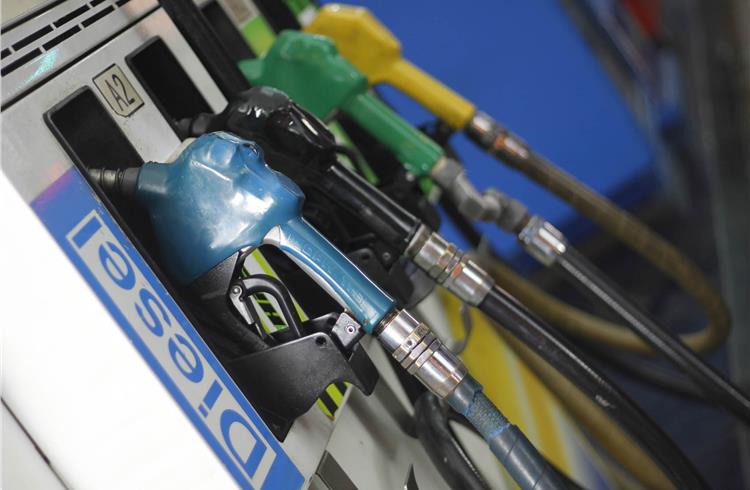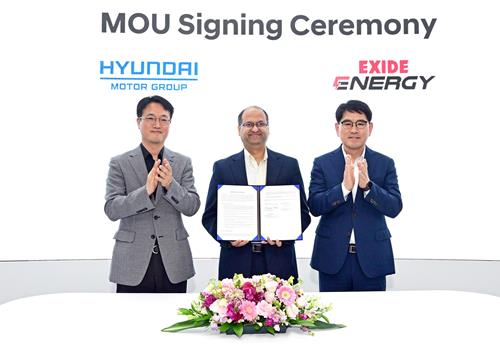Diesel deregulation could be a game-changer
In one of the first reactions to the deregulation of diesel on October 18, Nissan Motor India has welcomed the government’s initiative, describing it as a bold step.
In one of the first reactions to the deregulation of diesel prices on October 18, Nissan Motor India has welcomed the government’s initiative, describing it as a ‘bold step’.
“In the long run, we expect this move to bring about healthy competition in the fuel retailing sector and will allow customers to choose from across brands and quality of fuel, not just on price. We expect the deregulation to bring more maturity into customers’ preferences while car shopping. Overall, this is a positive step forward and we welcome it,” said Guillaume Sicard, president, Nissan India Operations, who recently took charge.
Meanwhile, N Raja, director and senior VP (Sales & Marketing), Toyota Kirloskar Motor, commented: "We welcome the government's decision to deregulate the price of diesel especially in time with the festive season. This is good for the consumers as they can now decide the car type, based on their preference and utility. The auto industry is witnessing a positive momentum and this step will further add to the upswing of the industry."
Soon after the price cut was announced, Anand Mahindra, chairman and managing director of Mahindra & Mahindra, tweeted: "Just what the doctor ordered. Not just because the cut will help boost the economy but because it signals commitment to freemarket reforms. It shows the government is coherent enough to to seize the right moment to to initiate a tough reform." And
Dr Pawan Goenka, executive director, M&M, also tweeted: "Because of lower fuel prices some states had imposed additional levies on diesel vehicles. Hope that will now be corrected."
The government has de-regulated prices of diesel four-and-a-half years after it deregulated petrol prices in June 2010. What helped the government’s decision was the fact that crude oil prices were at their lowest in the region of $84 a barrel. Moreover, as a result of the UPA’s decision to increase diesel prices by 50 paise a month, the price difference between both fuels is down to barely Rs 7-8 per litre. Following the de-regulation, prices of diesel have fallen by Rs 3.37 per litre (in New Delhi).
The Society of Indian Automobile Manufacturers (SIAM) has welcomed government’s move to de-regulate diesel price in the country. “This is a long-awaited measure and I am extremely happy that the prime minister has seized the opportunity of deregulating diesel price at a time when crude prices have fallen resulting in a reduction in diesel price due to the deregulation,” said Vikram Kirloskar, president, SIAM.
Kirloskar said that this is a forward-looking measure which proves that the Modi Government is now seriously focusing on implementing the long-pending economic reforms that would propel the country into its next high-growth phase.
With the price of diesel becoming market oriented, the huge under-recoveries on this account would fall, enabling the oil industry to invest in the next generation of cleaner and more environment-friendly fuels for the auto industry. It will also usher in private players which will make the fuels market in India truly competitive thus benefitting the customer. Reduction in the fiscal deficit will also help the government to battle inflation effectively paving the way for an early interest rate cut, he added. The resultant reduction in diesel price is also bound to result in lowering the costs for industry and transport leading to a deflationary impact on the economy as a whole.
“Overall, this one single move by the government could be the mother measure that could bring in a multi-pronged stimulus on the process of our economic recovery,” Kirloskar said.
Meanwhile, S P Singh, senior fellow and coordinator, Indian Foundation of Transport Research and Training (IFTRT), said, “Diesel de-regulation will be a game-changer for the transportation sector. The freight market should be based on free play and not artificially regulated by the government."
Singh says IFTRT has been asking for diesel de-regulation for decades now. Singh predicts that freight rates should come down after the festive season comes to an end. According to Singh, a transporter has 12-13 cost overheads that include the likes of insurance, toll, taxes and others. At present, 80 percent of the goods are moved through road transport. For the manufacturing sector, the back end and front end-cascading logistics-related costs of manufacturing price ranges between 16 percent to 20 percent.
Gurgaon-based Delhi Baroda Road Carrier (DBRTCL), which operates over 900 M&HCV vehicles, says, "Large corporate clients don't hike freight rates if there is a marginal rise in diesel price. They only negotiate freight rate if there is a hike of up to Rs 5. So invariably, transporters lose money due to higher diesel costs as there is hardly any way to absorb the cost of rising diesel price.”
An economist’s viewpoint
According to Madan Sabnavis of CARE Ratings, “Diesel price deregulation per se removes to a large extent the level of cost arbitrage between the using the two competing fuels, as the difference in price has been reduced considerably. The fact that this reduction is contemporaneous with declining crude oil prices and a stable exchange rate is good news for demand for automobiles in general. Therefore, the demand for passenger cars and two-wheelers will receive a boost in general though the specific demand for diesel vehicles will tend to reduce over time.
This said, the availability of finance at a competitive rate will be another driving force considering that a large proportion of such vehicles are purchased on the back of credit. Presently with interest rates still at a high, producers and dealers would still need to provide discounts to keep consumer interest up.
Going forward, the demand for vehicles will continue to be guided by fuel prices and hence the price of crude becomes important. Unlike the past, when the potential purchasers weighed the cost difference in petrol and diesel, today it will be more generalized and given the more positive environment effects of petrol relative to diesel, the demand would tend to move to petrol-driven vehicles. CNG-driven vehicles will continue to be attractive as the cost difference is still significant but would be restricted to geographies where refueling is easy. Producers will have to re-evaluate their production plans by deeply examining continuously the changes in customer preferences based on this move to deregulate the price completely.”
RELATED ARTICLES
IIT Bombay inaugurates Arun Firodia Research Floor
IIT Bombay, one of India’s top technical and research institutions, honours Kinetic Group chairman Dr Arun Firodia, one ...
Maruti Suzuki expands capacity at Manesar plant by additional 100,000 units
New assembly line at Plant A expands total manufacturing capacity at the Manesar plants to 900,000 units per annum. Alon...
Hyundai and Kia partner Exide Energy to produce LFP batteries in India
Partnership with Exide Energy enables Hyundai Motor and Kia to equip future EVs in the Indian market with locally produc...





 20 Oct 2014
20 Oct 2014
 2638 Views
2638 Views





 Autocar Pro News Desk
Autocar Pro News Desk




